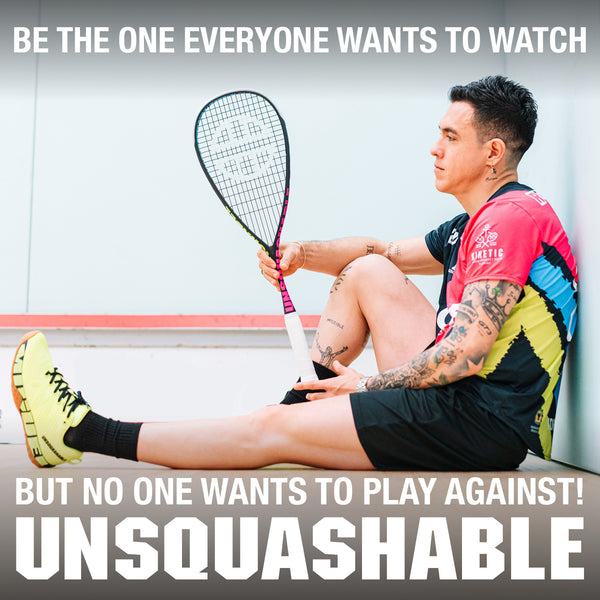Developing junior squash players by David Campion
February 01 2018

Coaching is an art form & you could argue that it is even more challenging in an open skill sport such as squash, where playing requires not only physical motor skills but cognitive skills such as problem-solving & decision-making.
England National Coach David Campion explains why the tactical elements & development of a player is every bit as important as their technical development.
The research will tell you that you don’t really need to specialise early to be Word Class, perhaps that is the case in closed-skill sports such as rowing or cycling, but in a highly skilled racket sport such as squash, it`s not impossible, just less likely. In any case, those that did start later & do `make it`, I suspect they were learning their physical motor & cognitive skills in other sports from an early age.
So, where does it all start?
The great players of today all came from somewhere & for the most part it starts in their local club, simply because one of their parents played or a school friend introduced them to the game.
Developing successful juniors starts in the clubs & counties where your coach or volunteers can provide the type of environment that offers 3 simple things:
Frequency: A lot of clubs focus solely on their Saturday morning junior club & don’t provide much of a structure for weekday after school sessions. Yes, they may have great numbers on a Saturday morning where the kids get to play for one hour, but who gets any better on one hour per week? Add weekday sessions for those that want to progress from the Saturday morning session.
Fun: All future champions initially go through a ‘romance’ phase early in their careers, meaning that they seem to fall in love with their sport & therefore become very passionate about their performance. The first coach is critical to the climate to hook the player into the sport.
Environment: Create an environment that is fun, has structure, has frequency of sessions with high numbers of players & still manages to be affordable for parents regardless of their situation.
To get frequency it needs to be affordable. For the cost of one individual lesson of an hour per week you could perhaps have four group sessions that gives you four of five hours of hitting & whilst learning decision making i.e. shot selection, height, pace, direction along with the physical motor skills. You are firing up your neural pathways at a far faster rate simply because you are playing more! Add in a coach who knows how to set up the practises & games that will enhance this & the rate of development is even faster. A lot like dialup vs. fibre broadband.
I`m not dismissing the case for individual coaching, it plays a vital role of course, but in the early years if you want to develop young players, they need to hit lots of balls whilst developing their cognitive skills. No need to isolate too much at this stage. Build their skills within the practises. Just make sure their grip is `within a range` that allows them to execute the variety of shots that the practices & conditions demand. Once the grip is in place the rest should follow, overlook that & it will be detrimental to their development.
The current top 10 men & women in squash all have very good technique, all very different as well, so who is to say what correct technique is? One thing they do better than everyone else, is they play the right shot at the right time; they are matching their cognitive skills with their physical motor skills (technique). Quite simply its `game intelligence`.
How can we learn ‘Game intelligence’?
There is no absolute fact about anything as all top sportspeople achieve great things in their own personal way, however if you can mimic the range of variations that you will experience in a match, you shouldn’t go too far wrong.
You can simply set up a practise or condition game which forces a player to land the ball in a particular area of the court i.e., within the confines of the width of the service box, or above the cut line to force them to hit high for example. This will force technical adaptations that the learner must solve without you telling them what to do.
This self-guided discovery provides them with intrinsic feedback, meaning they can repeat it if they did it well - they know how it felt. If you give them a few options within the game or the practise & they are up against an opponent, as opposed to you feeding, you are bringing in decision making based on their opponents position or type of shot they have just hit. It brings in a whole new dimension without isolating just the technical execution of the shot.
Make sure you build the foundations first with simple practices that will develop their ball control & footwork/positioning, so that when you start on the condition games, they have the control to play them. Set them up in channels where they learn to play straight, 5 players per court is easily manageable with limitations on courts.
As the coach you simply set up these condition games & guide them through, allowing them to fail & probe them to work it out, giving guidance & praise so they know when they have done something well.
Games are fun so you will get their engagement, they are hitting plenty of balls & will get better which provides a sensation of `I want to come back & do this again`. The bonus is an interactive social environment as they mix in with other children of varying ages & abilities.
Finally, all children like to get better at something, if they are improving, they will be inspired & will keep coming back. Lots of children playing the game often is what we all want isn’t it?
David Campion is the England Squash National Coach & one of the most respected squash coaches in the world.
England National Coach David Campion explains why the tactical elements & development of a player is every bit as important as their technical development.
The research will tell you that you don’t really need to specialise early to be Word Class, perhaps that is the case in closed-skill sports such as rowing or cycling, but in a highly skilled racket sport such as squash, it`s not impossible, just less likely. In any case, those that did start later & do `make it`, I suspect they were learning their physical motor & cognitive skills in other sports from an early age.
So, where does it all start?
The great players of today all came from somewhere & for the most part it starts in their local club, simply because one of their parents played or a school friend introduced them to the game.
Developing successful juniors starts in the clubs & counties where your coach or volunteers can provide the type of environment that offers 3 simple things:
Frequency: A lot of clubs focus solely on their Saturday morning junior club & don’t provide much of a structure for weekday after school sessions. Yes, they may have great numbers on a Saturday morning where the kids get to play for one hour, but who gets any better on one hour per week? Add weekday sessions for those that want to progress from the Saturday morning session.
Fun: All future champions initially go through a ‘romance’ phase early in their careers, meaning that they seem to fall in love with their sport & therefore become very passionate about their performance. The first coach is critical to the climate to hook the player into the sport.
Environment: Create an environment that is fun, has structure, has frequency of sessions with high numbers of players & still manages to be affordable for parents regardless of their situation.
To get frequency it needs to be affordable. For the cost of one individual lesson of an hour per week you could perhaps have four group sessions that gives you four of five hours of hitting & whilst learning decision making i.e. shot selection, height, pace, direction along with the physical motor skills. You are firing up your neural pathways at a far faster rate simply because you are playing more! Add in a coach who knows how to set up the practises & games that will enhance this & the rate of development is even faster. A lot like dialup vs. fibre broadband.
I`m not dismissing the case for individual coaching, it plays a vital role of course, but in the early years if you want to develop young players, they need to hit lots of balls whilst developing their cognitive skills. No need to isolate too much at this stage. Build their skills within the practises. Just make sure their grip is `within a range` that allows them to execute the variety of shots that the practices & conditions demand. Once the grip is in place the rest should follow, overlook that & it will be detrimental to their development.
The current top 10 men & women in squash all have very good technique, all very different as well, so who is to say what correct technique is? One thing they do better than everyone else, is they play the right shot at the right time; they are matching their cognitive skills with their physical motor skills (technique). Quite simply its `game intelligence`.
How can we learn ‘Game intelligence’?
There is no absolute fact about anything as all top sportspeople achieve great things in their own personal way, however if you can mimic the range of variations that you will experience in a match, you shouldn’t go too far wrong.
You can simply set up a practise or condition game which forces a player to land the ball in a particular area of the court i.e., within the confines of the width of the service box, or above the cut line to force them to hit high for example. This will force technical adaptations that the learner must solve without you telling them what to do.
This self-guided discovery provides them with intrinsic feedback, meaning they can repeat it if they did it well - they know how it felt. If you give them a few options within the game or the practise & they are up against an opponent, as opposed to you feeding, you are bringing in decision making based on their opponents position or type of shot they have just hit. It brings in a whole new dimension without isolating just the technical execution of the shot.
Make sure you build the foundations first with simple practices that will develop their ball control & footwork/positioning, so that when you start on the condition games, they have the control to play them. Set them up in channels where they learn to play straight, 5 players per court is easily manageable with limitations on courts.
As the coach you simply set up these condition games & guide them through, allowing them to fail & probe them to work it out, giving guidance & praise so they know when they have done something well.
Games are fun so you will get their engagement, they are hitting plenty of balls & will get better which provides a sensation of `I want to come back & do this again`. The bonus is an interactive social environment as they mix in with other children of varying ages & abilities.
Finally, all children like to get better at something, if they are improving, they will be inspired & will keep coming back. Lots of children playing the game often is what we all want isn’t it?
David Campion is the England Squash National Coach & one of the most respected squash coaches in the world.







